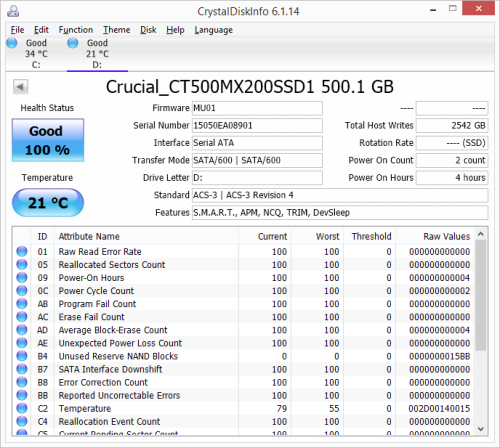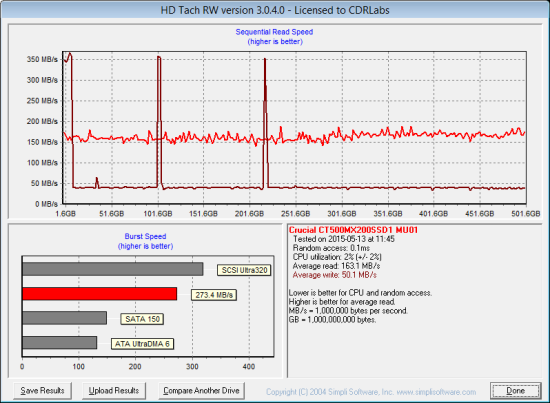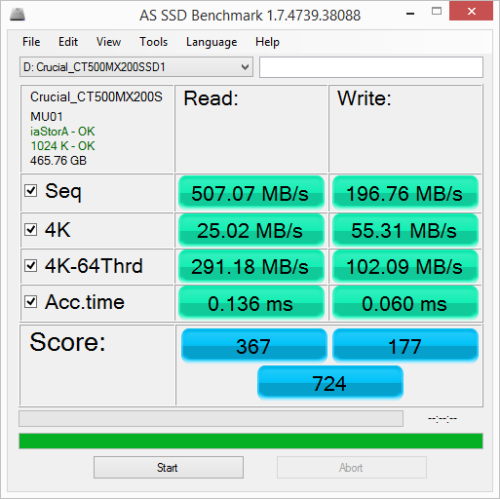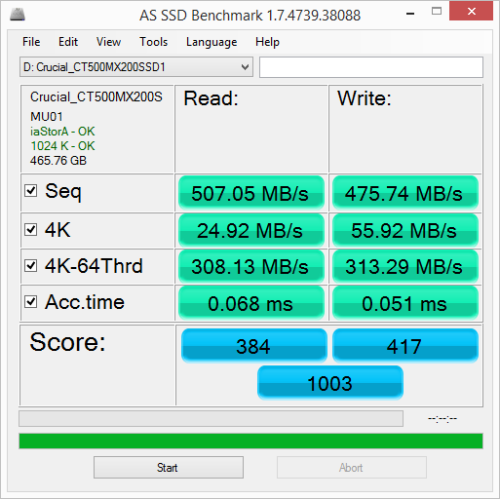TRIM Performance:
While SSD's offer many benefits, there are some downsides to using flash memory. One of the biggest issues people run into is performance degradation. Over time, an SSD will run out of fresh blocks and will have to write over data the file system has marked as deleted. This procedure is very complicated and can slow an SSD's write speeds considerably.
To fix this problem, most manufacturers have added TRIM support to their SSDs. The TRIM command allows an operating system, such as Windows 7, to tell an SSD which data blocks are no longer in use. Using this information, the drive pro-actively erases these blocks and adds them to the free block pool.

To test the MX200's TRIM and garbage collection functions, I first put the drive in a "dirty" state. I used Iometer to fill the entire drive and then ran a random write test for 30 minutes. Looking at the screenshot below, you can see that the MX200's average read and write speeds dropped to 163.1 MB/s and 50.1 MB/s, respectively.

Crucial MX200 - Dirty
I let the computer sit for about an hour and a half and then reran the test. Looking at the screenshot below, you can see that the Crucial MX200's average write speed had increased to 66.0 MB/s. Needless to say, this was not the result I expected, especially when you consider how well the MX100 and BX100 did in this test.

Crucial MX200 - After TRIM
With this in mind, I went back and reran the test using AS SSD instead of HD Tach. AS SSD isn't as low level as HD Tach nor does it produce a nice looking graph. However, it does let us test a drive's read and write speeds without having to delete the volume. I used Iometer to fill 80% of the drive and then ran a random write test for 30 minutes. This had very little effect on the drive's read speed. However, its sequential write speed dropped to 132.17 MB/s

Crucial MX200 - Dirty
I let the computer sit for about 60 minutes and then reran the test. The MX200 wasn't able to reach the factory fresh performance shown in our earlier tests. However, its average write speed climbed up to 196.76 MB/s.

Crucial MX200 - After TRIM
Lastly, I used Parted Magic to perform a secure erase on the MX200. With the drive wiped clean, it had average read and write speeds of 507.05 MB/s and 475.74 MB/s, respectively.

Crucial MX200 - Secure Erase
Final Thoughts:
Crucial's MX200 is a great choice for the consumer or enthusiast looking for an SSD that delivers excellent performance, innovative features and long term endurance. Like its predecessor, the MX100, the drive combines Marvell's 88SS9187 controller with Micron's 16nm 128gb NAND flash to produce some impressive performance numbers. In our sequential read and write tests, the MX200 was able to read at speeds as high as 547 MB/s and write at speeds in excess of 471 MB/s. It also did very well in our random write tests, producing more than 88,000 IOPS at low queue depths. That being said, the MX200 did have some problems recovering once it was filled with data and put in a "dirty" state. This is something that the average consumer will probably never run into. However, as an enthusiast, I hope that Crucial will address this in a future firmware update.
Fast read and write speeds aren't the only things the MX200 has to offer. Along with thermal and power loss protection, TRIM support and active garbage collection, the drive features AES 256-bit full disk encryption and is compatible with both the TCG Opal and IEEE 1667 specifications. The MX200 also uses Dynamic Write Acceleration to enable faster saves and file transfers, and technologies like Data Defense and Redundant Array of Independent NAND (RAIN) to guard against corruption and protect your data. Last, but not least, the MX200 supports the SATA Device Sleep (DEVSLP) standard which extends the battery life of a device by reducing the drive's power consumption when it's not in use.
The MX200 is available now in 250GB, 500GB and 1TB capacities. Prices on Amazon.com and Pricegrabber currently range from $110 up to $444, with the 500GB version reviewed here going for about $200.
Highs:
- Available in 250GB, 500GB and 1TB capacities
- Excellent sequential read and write speeds
- Very good random read and write performance
- Performs equally well with compressible and incompressible data
- SATA 6Gb/s interface
- Large DRAM cache
- Dynamic Write Acceleration, Data Defense and RAIN technologies
- AES 256-bit full disk encryption
- TCG Opal and IEEE 1667 compliant
- DEVSLP power mode
- Supports TRIM, SMART and active garbage collection
- Thermal and power loss protection
- Ultra-slim form factor
- Includes mounting spacer for 9.5mm applications
- 3 year warranty
- Reasonably priced
Lows:
- Performance is slow to recover once it has reached a "dirty" state

